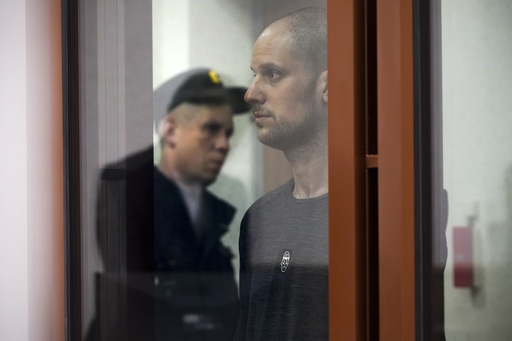In early 2022, Wall Street Journal reporter Evan Gershkovich wrote on social media that “reporting on Russia is now also a regular practice of watching people you know get locked away for years.”
A year later, he was the one locked up — arrested in March 2023 on charges of spying that his employer and the U.S. government have denounced as fabricated. On Friday, he was convicted and sentenced to 16 years in prison.
The Federal Security Service, or FSB, alleged the 32-year-old journalist was acting on U.S. orders to collect state secrets but provided no evidence to support the accusation. Washington designated him as wrongfully detained.
The arrest of Gershkovich — the first U.S. journalist taken into custody on espionage charges since Nicholas Daniloff in 1986 at the height of the Cold War — came as a shock, even though Russia had enacted increasingly repressive laws on freedom of speech after the invasion of Ukraine in February 2022.
“He was accredited by the Russian Foreign Ministry. There was nothing to suggest that this was going to happen,” said Emma Tucker, the Journal’s editor-in-chief in an interview in March.
Since the invasion, Russian authorities have detained several U.S. nationals and other Westerners, and Gershkovich knew the risks, said Washington Post correspondent and friend Francesca Ebel.
After his arrest, he knew “right from the very start that this was going to take a long time,” she said.
Since his detention, Gershkovich has appeared more than a dozen times in Russian courtrooms — first in Moscow, where he was held at the notorious Lefortovo Prison, and then at the Sverdlovsk Regional Court in the Ural Mountains city of Yekaterinburg.
His pretrial appearances became almost formulaic, as Gershkovich was led in handcuffs over and over from a prison van to a glass defendants cage. They offered his family and friends both a painful reminder of his detention but also a chance to lay eyes on him.
“It’s always a mixed feeling. I’m happy to see him and that he’s doing well, but it’s a reminder that he is not with us. We want him at home,” Gershkovich’s mother, Ella Milman, told The Associated Press in an interview in March.
Although Gershkovich was often seen smiling in the brief appearances, friends and family said he found it hard to face a wall of cameras pointed at him as if he were an animal in a zoo.
As his trial started behind closed doors on June 26, Gershkovich stood in the defendants cage with a shaved head as the media were allowed briefly into the court.
It was the last time Gershkovich’s friends and family were able to see him until his conviction.
Now he has been found guilty, there will likely be few opportunities to see him — and friends and family can now only hope for his release in a prisoner swap.
But no one knows when that might be.
Russian Foreign Minister Sergey Lavrov said Wednesday at the United Nations that discussions about an exchange involving Gershkovich are ongoing. Russia has previously signaled the possibility of a swap, but said a verdict had to come first. Even now, any such deal could take months or years.
The Journal’s Tucker has said she is “optimistic that 2024 will be the year Evan is freed but I’m also realistic,” noting that any negotiations for a swap are taking place against a “very febrile” backdrop.
The son of Soviet emigres who settled in New Jersey, Gershkovich was fluent in Russian and moved to Russia in 2017 to work for The Moscow Times newspaper before being hired by the Journal in 2022.
“He absolutely loved it,” Milman said of her son’s life in Moscow.
He threw himself into work and became close friends with other reporters. They went to traditional Russian saunas, cycled around Moscow or had barbecues in the countryside.
Now, friends and family say Gershkovich is relying on his sense of humor to get through the days.
At Lefortovo, Gershkovich was not allowed phone calls and woke up “every morning to the same gray prison wall,” said his friend, Polina Ivanova, of the Financial Times.
He was allowed out of his cell for a hour a day to exercise and spent the rest of his time largely reading and writing letters.
Mikhail Gershkovich wrote his son about chess strategy and Gershkovich tried to teach his cellmate the game. They also discussed artificial intelligence because “he wants to be current when he comes back,” his father said.
From behind bars, he organized presents for friends on their birthdays as well as sending flowers to important women in his life for International Women’s Day earlier this month.
“He is telling people not to freak out,” said Milman, noting that her son is a source of great pride for the family.
But with no end in sight to his detention, the strain on them is showing.
Every day, Milman said, “I wake up and look at the clock.”
“I think about if his lunchtime has passed, and his bedtime,” she said. “It’s very hard. It’s taking a toll.”
Source: post





